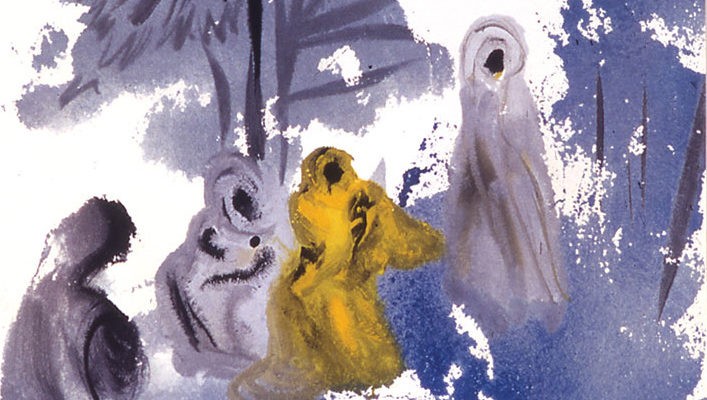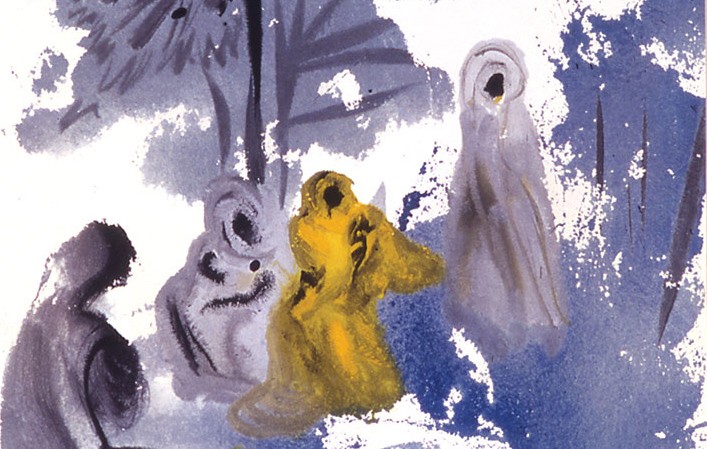The transition from one presidential administration to the next has been disrupted by the refusal of the present occupant to accept the verdict of the voters. He and his followers are clinging to the White House. And a substantial company of voters have joined the president to say, without any evidence, that the election is not legitimate — that the clearly expressed will of the people is, in fact, fraudulent.
For theological guidance in this perplexing situation I have turned, of all places, to the book of Ezra, and the story of the return of exiled Jews from Babylonian captivity. The exiles came back to their home country and set about to rebuild the destroyed temple. It was a time of great celebration and hope for the future. The book of Ezra describes this celebration in lavish detail. But then disturbing news interrupts the festivities.

Richard Hester
Ezra hears this: “The people of Israel, the priests and the Levites have not separated themselves from the peoples of the lands with their abominations … for they have taken some of their daughters as wives for themselves and for their sons. Thus the holy seed has mixed itself with the peoples of the lands, and in this faithlessness the officials and leaders have led the way.”
“When I heard this,” reports Ezra, “I tore my garment and my mantle, and pulled hair from my head and beard, and sat appalled. Then all who trembled at the words of the God of Israel, because of the faithlessness of the returned exiles, gathered around me while I sat appalled until the evening sacrifice.”
Ezra cries and throws himself down before the temple and the people — desperate to know what to do in this awful turn of events. It is quite a scene. Then one of his leaders tells him: “We have broken faith with our God and have married foreign women from the peoples of the land, but even now there is hope for Israel in spite of this. So now let us make a covenant with our God to send away all these wives and their children, according to the counsel of my lord and of those who tremble at the commandment of our God.”
Ezra accepts this awful advice and orders that the people swear to follow it. And they do so. The book of Ezra ends with a list of the men who have married foreign wives and this terrible conclusion, “All these had married foreign women, and they sent them away with their children.” End of story.
“But this isn’t the end of the story, because an alternative narrative is embedded in the little book of Ruth.”
But this isn’t the end of the story, because an alternative narrative is embedded in the little book of Ruth. It tells how a Jewish family, during a famine in Israel, immigrated to Moab where there was food.
The father is Elimelech, and the mother is Naomi. They have two sons, and these sons marry Moabite women — Orpha and Ruth. Elimelech and both sons die, leaving three widows. Naomi decides to return to Israel, her homeland. Both daughters-in-law want to go with her, but she urges them to stay with their own Moabite people. Orpha stays, but Ruth insists on going to Israel with Naomi.
Upon their arrival, Ruth gleans barley in a field belonging to Boaz, and he takes a romantic interest in her. Following Naomi’s advice, she reciprocates, and they marry. Ruth bears a son, whom they name Obed.
This is a beautiful story of romance and of the deep friendship between Naomi and her daughter-in-law Ruth, but there’s more to this idyllic narrative. The book of Ruth ends with a genealogy that says of the child of Ruth and Boaz: “They named him Obed; he became the father of Jesse, the father of David.”
The Ezra story of the celebration of the exiled Jews returning to their homeland was interrupted by the news of marriages with foreign women. These mixed marriages receive a stunning declaration that their foreign wives, and their children, are “unclean.” And the Moabites are numbered among these unclean people. The book of Ezra ends with the terrible conclusion that the men who had married foreign women “sent them away with their children.”
“The whole idea of the uncleanness of non-Israelites has been undermined by Ruth, who is the Moabite grandmother of King David.”
But wait! Listen to the book of Ruth. Obed, the son of Ruth the Moabite, this child of a mixed marriage, is the grandfather of King David. The whole idea of the uncleanness of non-Israelites has been undermined by Ruth, who is the Moabite grandmother of King David. The prophetic tradition in Israel, in the genealogy of the book of Ruth, declares that God is not a God who separates people into clean and unclean.
The president and his followers have engaged in a desperate effort to hold on to the White House. In fact, whiteness is the very core of this desperation.
In his recent book, White Too Long: The Legacy of White Supremacy in American Christianity, Robert P. Jones writes that “whiteness is the mortar holding together the fortress of white supremacy, and if it crumbles, those walls will inevitably collapse. Because of its binding importance, the idea of whiteness has been, and remains today, vigilantly defended. In fact, virtually nothing has proven too costly a sacrifice on the altar of its defense: the bloodbath of the Civil War, the construction of a segregated education system, the creation of an apartheid Jim Crow system of laws enforcing segregation across all aspects of society … the development of a criminal justice system that disproportionately incarcerates millions of Black men … . If one stops long enough to reflect on it, the ransom this fiction has demanded to sustain itself is staggering.”
This quest for uncontaminated white supremacy is not that different from the severe demand of Ezra that families be torn apart to protect Israelites from foreign contamination. The story of Ruth undermines the command that Jewish men who have married foreign wives put their wives away along with their children.
“Ezra has one vision of God’s intention, but the book of Ruth has quite a different vision.”
What is the message of the book of Ruth today? Ezra has one vision of God’s intention, but the book of Ruth has quite a different vision.
Marcus Borg distinguishes between these two views of God’s intention. One view says, “Be holy as God is holy,” which seeks to protect privilege. A second view of God’s intention says, “Be compassionate as God is compassionate,” which is an intention of love and inclusion. Borg goes on to say, “For Jesus, compassion was more than a quality of God and an individual virtue: it was a social paradigm, the core value for life in community. To put it boldly: compassion for Jesus was political. He directly and repeatedly challenged the dominant sociopolitical paradigm of his social world and advocated instead what might be called a politics of compassion.”
The book of Ruth expresses a politics of compassion. Ezra expresses a politics of privileged status. Clinging to the White House in the face of an election that clearly replaces the present occupant is clinging to the power and privilege of whiteness.
The impasse of the transition between the president and the president-elect will soon be resolved, difficult though that may be. But the essence of this contest about whiteness will continue as it has since 1619 when the first slave ship, the White Lion, landed in Virginia.
Richard Hester taught pastoral theology for more than 20 years at two seminaries. After serving as executive director of the Georgia Association for Pastoral Care, he continued his career as a therapist at a pastoral counseling center in Raleigh, N.C., where he established the Narrative Therapy Seminar in 1997. He received two degrees from Southern Baptist Theological Seminary.


